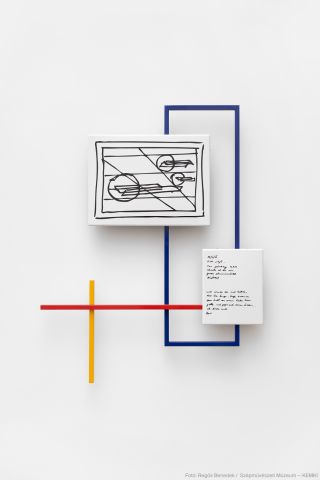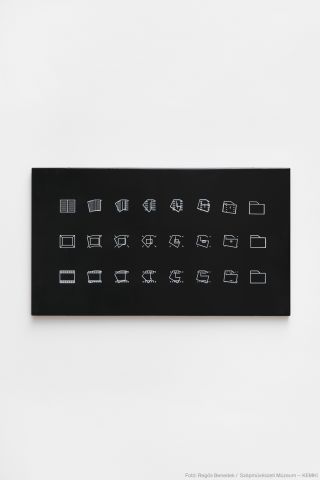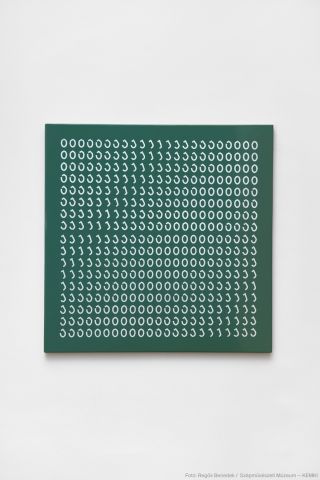‘collection’
ALBERT Ádám: My Appropriations (László Moholy-Nagy), 2022
… was acquired by the Hungarian National Bank from the artist’s nephew, Levente Nagy in 2015. The collection primarily aids in scholarly research. In addition to lists of artworks, books and other publications, it also includes a few autograph letters and early watercolours, which had been left in the family’s possession.
ALBERT Ádám: System Analysis V, 2022–2023
… requirement when it comes to constructing an institutional structure—and especially an archive/collection. The vertically proceeding, Neurathian-type flow diagrams of morphing white shapes projected onto a black enamel surface reminiscent of a switched off monitor screen model this process along three possible paths, all leading to the same destination. The forms derived from textual, framed pictorial (painting, print, etc.), motion picture- and photography-based (perforated edge) media …
GRÓF Ferenc: Somewhere between 0 and 1 (Hungarian National Painting Grey), 2016–2023
… enamel work invokes the artist’s 2012 piece entitled State of Shades, found in the Contemporary Collection of the Hungarian National Gallery.[2] At KEMKI, the “colour average” of the latter work—having been determined by digitally blending the colours of paintings held at the Hungarian National Gallery, in the “interpretation” of the Bonyhád artists—is given a slight tint of military green. The web of references connected to this minimalist and reduced visual world can be widened: …
Documents of János Tornyai (1869-1936)
… of the Hódmezővásárhely artists’ group, and the establisher of the ethnographic and fine arts collection of the local municipal museum named after him. Following Tornyai’s death in 1936, a significant portion of the paintings and documents he left behind disappeared.They were only found much later, after the passing of his widow in 1983, under the floorboards of the painter’s last studio in Horányszky Street, Budapest. The painting estate was shared between the János Tornyai Museum in …
The Design Center Archives
… Information Centre of Industrial Design (better known as the Design Center), became part of the collection of the Museum of Fine Arts – Central European Research Institute for Art History (ADK). The organisation was established in 1975 within the framework of the Chamber of Commerce, which—alongside the Industrial Design Council Office—carried out representative and influential work in the field of Hungarian industrial design until the late 1980s. The Design Council dealt with the …




